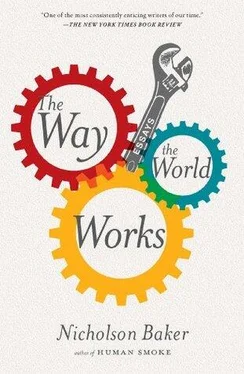Nicholson Baker - The Way the World Works
Здесь есть возможность читать онлайн «Nicholson Baker - The Way the World Works» весь текст электронной книги совершенно бесплатно (целиком полную версию без сокращений). В некоторых случаях можно слушать аудио, скачать через торрент в формате fb2 и присутствует краткое содержание. Год выпуска: 2012, Издательство: Simon & Schuster, Жанр: Публицистика, Критика, на английском языке. Описание произведения, (предисловие) а так же отзывы посетителей доступны на портале библиотеки ЛибКат.
- Название:The Way the World Works
- Автор:
- Издательство:Simon & Schuster
- Жанр:
- Год:2012
- ISBN:нет данных
- Рейтинг книги:4 / 5. Голосов: 1
-
Избранное:Добавить в избранное
- Отзывы:
-
Ваша оценка:
- 80
- 1
- 2
- 3
- 4
- 5
The Way the World Works: краткое содержание, описание и аннотация
Предлагаем к чтению аннотацию, описание, краткое содержание или предисловие (зависит от того, что написал сам автор книги «The Way the World Works»). Если вы не нашли необходимую информацию о книге — напишите в комментариях, мы постараемся отыскать её.
), here assembles his best short pieces from the last fifteen years.
The Way the World Works
OED
Modern Warfare 2
Through all these pieces, many written for
, and
, Baker shines the light of an inexpugnable curiosity.
is a keen-minded, generous-spirited compendium by a modern American master.
The Way the World Works — читать онлайн бесплатно полную книгу (весь текст) целиком
Ниже представлен текст книги, разбитый по страницам. Система сохранения места последней прочитанной страницы, позволяет с удобством читать онлайн бесплатно книгу «The Way the World Works», без необходимости каждый раз заново искать на чём Вы остановились. Поставьте закладку, и сможете в любой момент перейти на страницу, на которой закончили чтение.
Интервал:
Закладка:
Bedbugs are generally active only at dawn, with a peak attack period about an hour before dawn, though given the opportunity, they may attempt to feed at your brain at other times.
A few weeks later, somebody replaced everything with:
BED BUGS MOTHER FUCKER THEY GON GET YO MOTHAFUCKING ASS BRAAAAAAAT FOOL BRAAAAAAAAAAAAAAAP.
A piece of antivandalism software, VoABot II, reverted that edit, with a little sigh, less than a minute after it was made.
Vandalism spiked in August 2006 after comedian Stephen Colbert — in the wake of Stacy Schiff’s excellent but slightly frosty New Yorker article about Wikipedia — invited viewers of his show to post made-up facts about the increase in the population of African elephants, as proof of the existence of something that was not reality but “wikiality”—a cheap shot, but mildly funny. People repeatedly went after the elephant page, and it was locked for a while. But not for very long. The party moved on.
The Pop-Tarts page is often aflutter. Pop-Tarts, it says as of today (February 8, 2008), were discontinued in Australia in 2005. Maybe that’s true. Before that it said that Pop-Tarts were discontinued in Korea. Before that Australia. Several days ago it said: “Pop-Tarts is german for Little Iced Pastry O’ Germany.” Other things I learned from earlier versions: More than two trillion Pop-Tarts are sold each year. George Washington invented them. They were developed in the early 1960s in China. Popular flavors are “frosted strawberry, frosted brown sugar cinnamon, and semen.” Pop-Tarts are a “flat Cookie.” No: “Pop-Tarts are a flat Pastry, KEVIN MCCORMICK is a FRIGGIN LOSER not to mention a queer inch.” No: “A Pop-Tart is a flat condom.” Once last fall the whole page was replaced with “NIPPLES AND BROCCOLI!!!!!”
This sounds chaotic, but even the Pop-Tarts page is under control most of the time. The “unhelpful” or “inappropriate”—sometimes stoned, racist, violent, metal-headed — changes are quickly fixed by human stompers and algorithmicized helper bots. It’s a game. Wikipedians see vandalism as a problem, and it certainly can be, but a Diogenes-minded observer would submit that Wikipedia would never have been the prodigious success it has been without its demons.
This is a reference book that can suddenly go nasty on you. Who knows whether, when you look up Harvard’s one-time warrior-president, James Bryant Conant, you’re going to get a bland, evenhanded article about him, or whether the whole page will read (as it did for seventeen minutes on April 26, 2006): “HES A BIGSTUPID HEAD.” James Conant was, after all, in some important ways, a big stupid head. He was studiously anti-Semitic, a strong believer in wonder-weapons — a man who was quite as happy figuring out new ways to kill people as he was administering a great university. Without the kooks and the insulters and the spray-can taggers, Wikipedia would just be the most useful encyclopedia ever made. Instead it’s a fast-paced game of paintball.
Not only does Wikipedia need its vandals — up to a point — the vandals need an orderly Wikipedia, too. Without order, their culture-jamming lacks a context. If Wikipedia were rendered entirely chaotic and obscene, there would be no joy in, for example, replacing some of the article on Archimedes with this:
Archimedes is dead.
He died.
Other people will also die.
All hail chickens.
The Power Rangers say “Hi”
The End.
Even the interesting article on culture jamming has been hit a few times: “Culture jamming,” it said in May 2007, “is the act of jamming tons of cultures into 1 extremely hot room.”
When, last year, some computer scientists at the University of Minnesota studied millions of Wikipedia edits, they found that most of the good ones — those whose words persisted intact through many later viewings — were made by a tiny percentage of contributors. Enormous numbers of users have added the occasional enriching morsel to Wikipedia — and without this bystander’s knowledge the encyclopedia would have gone nowhere — but relatively few users know how to frame their contribution in a form that lasts.
So how do you become one of Wikipedia’s upper crust — one of the several thousand whose words will live on for a little while, before later verbal fumarolings erode what you wrote? It’s not easy. You have to have a cool head, so that you don’t get drawn into soul-destroying disputes, and you need some practical writing ability, and a quick eye, and a knack for synthesis. And you need lots of free time — time to master the odd conventions and the unfamiliar vocabulary (words like smerge, POV warrior, forum shopping, hatnote, meat puppet, fancruft, and transclusion ), and time to read through guidelines and policy pages and essays and the endless records of old skirmishes — and time to have been gently but firmly, or perhaps rather sharply, reminded by other editors how you should behave. There’s a long apprenticeship of trial and error.
At least, that’s how it used to be. Now there’s a quicker path to proficiency: John Broughton’s Wikipedia: The Missing Manual, part of the Missing Manual series, overseen by the New York Times ’s cheery electronics expert, David Pogue. “This Missing Manual helps you avoid beginners’ blunders and gets you sounding like a pro from your first edit,” the book says on the back. In his introduction, Broughton, who has himself made more than 15,000 Wikipedia edits, putting him in the elite top 1,200 of all editors — promises “the information you absolutely need to avoid running afoul of the rules.” And it’s true: this manual is enlightening, well organized, and full of good sense. Its arrival may mark a new, middle-aged phase in Wikipedia’s history; some who read it will probably have wistful longings for the crazy do-it-yourself days when the whole project was just getting going. In October 2001, the first Wikipedian rule appeared. It was:
Ignore all rules: If rules make you nervous and depressed, and not desirous of participating in the wiki, then ignore them entirely and go about your business.
The “ignore all rules” rule was written by cofounder Larry Sanger and signed by cofounder Jimbo Wales, along with WojPob, AyeSpy, OprgaG, Invictus, Koyaanis Qatsi, Pinkunicorn, sjc, mike dill, Taw, GWO, and Enchanter. There were two dissenters listed, tbc and AxelBoldt.
Nowadays there are rules and policy banners at every turn — there are strongly urged warnings and required tasks and normal procedures and notability guidelines and complex criteria for various decisions — a symptom of something called instruction creep: defined in Wikipedia as something that happens “when instructions increase in number and size over time until they are unmanageable.” John Broughton’s book, at a mere 477 pages, cuts through the creep. He’s got a whole chapter on how to make better articles (“Don’t Suppress or Separate Controversy”) and one on “Handling Incivility and Personal Attacks.” Broughton advises that you shouldn’t write a Wikipedia article about some idea or invention that you’ve personally come up with; that you should stay away from articles about things or people you really love or really hate; and that you shouldn’t use the encyclopedia as a PR vehicle — for a new rock band, say, or an aspiring actress. Sometimes Broughton sounds like a freshman English comp teacher, a little too sure that there is one right and wrong way to do things: Strunk without White. But honestly, Wikipedia can be confusing, and you need that kind of confidence coming from a user’s guide.
The first thing I did on Wikipedia (under the username Wageless) was to make some not-very-good edits to the page on bovine somatotropin. I clicked the “edit this page” tab, and immediately had an odd, almost light-headed feeling, as if I had passed through the looking glass and was being allowed to fiddle with some huge engine or delicate piece of biomedical equipment. It seemed much too easy to do damage; you ask, Why don’t the words resist me more? Soon, though, you get used to it. You recall the central Wikipedian directive: “Be Bold.” You start to like life on the inside.
Читать дальшеИнтервал:
Закладка:
Похожие книги на «The Way the World Works»
Представляем Вашему вниманию похожие книги на «The Way the World Works» списком для выбора. Мы отобрали схожую по названию и смыслу литературу в надежде предоставить читателям больше вариантов отыскать новые, интересные, ещё непрочитанные произведения.
Обсуждение, отзывы о книге «The Way the World Works» и просто собственные мнения читателей. Оставьте ваши комментарии, напишите, что Вы думаете о произведении, его смысле или главных героях. Укажите что конкретно понравилось, а что нет, и почему Вы так считаете.












